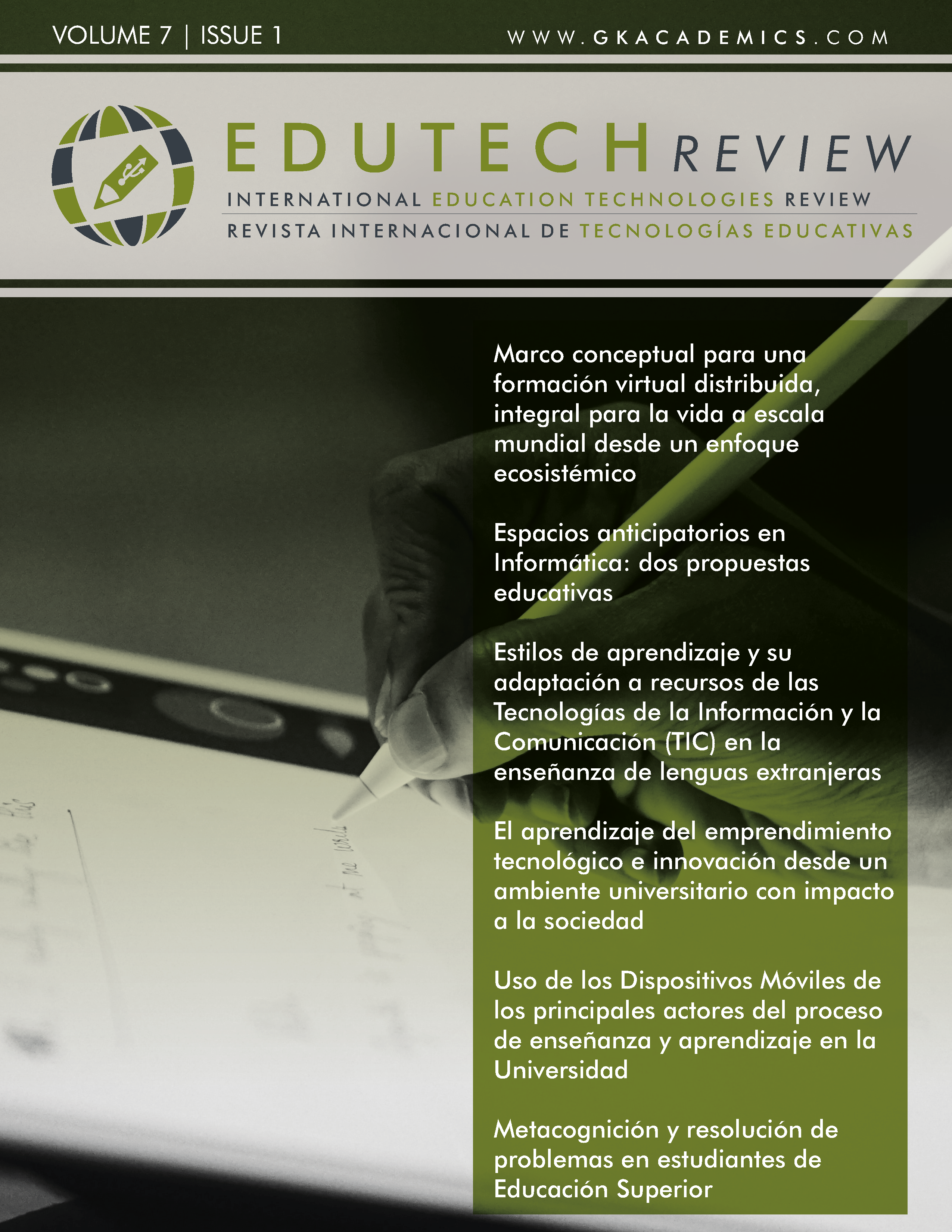Anticipatory Spaces in Informatics: Two Educational Proposals
DOI:
https://doi.org/10.37467/gka-revedutech.v7.1942Keywords:
Anticipatory Space, Institutional Affiliation, Programming Teaching, Free SoftwareAbstract
The term "anticipatory space", used in multiple disciplines, had no formal definition in Informatics. Concepts related to the virtual were analysed in order to arrive at a definition within that field, and a possible classification was set forth. Moreover, FI3D is presented as an example, which is an application used as the basis for two educational proposals that allowed the analysis and evaluation of the impact of having an anticipatory space -- TIVU Virtual, a challenge-based serious game aimed at University first-year students, and ProBots3D, an environment for the first approach to programming at schools.
Global Statistics ℹ️
|
328
Views
|
123
Downloads
|
|
451
Total
|
|
References
Banchoff Tzancoff, C. (2018). ProBots3D: programando Robots en 3D. Una herramienta libre para enseñar programación a niños y jóvenes. Disponible en http://hdl.handle.net/10915/67659 Último acceso julio de 2020. DOI: https://doi.org/10.24215/18509959.21.e12
Croci de Romero, L. & González, S. (2017) “Psicoprofilaxis de la revisación: Abriendo puertas para un abordaje integral”. Disponible en: http://www.buenosaires.gob.ar/areas/salud/dircap/mat/trabajos/psicoped/07/laxis.pdf. Último acceso julio de 2020.
Coulon, A. (1995). Etnometodología y educación. Barcelona. Ed. Paidos.
Coulon, A. (2005). Le métier d’étudiant. L’entrée dans la vie universitaire. Paris. Ed. Deuxième.
Dïaz, J., Banchoff Tzancoff, C. Queiruga, C. & Martin, E. (2014). Experiencias de la Facultad de Informática en la Enseñanza de Programación en Escuelas con Software Libre. Congreso Iberoamericano de Ciencia, Tecnología, Innovación y Educación. Buenos Aires, Argentina.
Diaz J, Harari, I. y Harari V. (2013). University project: The marginalized neighborhood goes to University .Marrakech, Marruecos. ISBN 978-9954-9091-2-6.
Facultat d’Informàtica de Barcelona (2018) . Realidad virtual. Disponible en https://www.fib.upc.edu/retro-informatica/avui/realitatvirtual.html Último acceso: julio de 2020.
Harari V. & Banchoff C. (2016). FI3D: An Anticipatory Space. International Conference on Engineering Education & Research ICEER. Australia. ISBN: 978-0-646-95724-1, 154-160.
Harari, V. (2018). Taller virtual de inserción a la vida universitaria (Doctoral dissertation, Facultad de Informática). Disponible en http://hdl.handle.net/10915/67661. Último acceso julio de 2020.
Leal, D. (2011). Ambientes personales de aprendizaje en el desarrollo profesional docente. Capítulo VI del libro “El modelo Ceibal: Nuevas tendencias para el aprendizaje”. Página 146-147 .
Mejía Luna, J. N. (2012). Realidad Virtual, Estado del arte análisis crítico (Master’s thesis, Universidad de Granada/2012).
Valenzuela Medina J. E., (2011). Formación De Identidad En Estudiantes Universitarios: Un Diseño Combinado Secuencial Explicativo. Tesis Doctoral. Disponible en: https://www.ciad.mx/archivos/desarrollo/publicaciones/Tesis%20asesoradas/Doctorado/ValenzuelaErnesto.pdf. Último acceso julio de 2020.
Downloads
Published
How to Cite
Issue
Section
License
Copyright (c) 2022 EDUTECH REVIEW. International Education Technologies Review / Revista Internacional de Tecnologías Educativas

This work is licensed under a Creative Commons Attribution-NonCommercial-NoDerivatives 4.0 International License.
Those authors who publish in this journal accept the following terms:
- Authors will keep the moral right of the work and they will transfer the commercial rights.
- After 1 year from publication, the work shall thereafter be open access online on our website, but will retain copyright.
- In the event that the authors wish to assign an Creative Commons (CC) license, they may request it by writing to publishing@eagora.org







